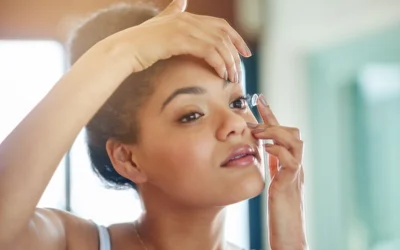Have you been dealing with dry, itchy, irritated eyes? It could be more than just the dry weather or staring at screens for too long. In some cases, underlying medical conditions may be the culprit behind your dry eye symptoms. Let’s take a look at some medical conditions that can cause or worsen dry eye symptoms.
Autoimmune diseases
Autoimmune conditions like Sjögren’s syndrome, rheumatoid arthritis, or lupus can attack the glands that produce tears, leading to decreased tear production and dry eye symptoms. If you have been diagnosed with an autoimmune disease, it’s essential to let your eye doctor know about any vision changes or discomfort you may be experiencing. They can help develop a treatment plan to manage your dry eye symptoms effectively.
Diabetes
Another medical condition that can contribute to dry eye is diabetes. High blood sugar levels associated with diabetes can damage blood vessels in the eyes and impact nerve function, leading to decreased tear production and dryness. Managing your diabetes through proper diet, exercise, and medication is crucial not only for overall health but also for preventing complications such as dry eye.
Vitamin deficiencies
Vitamin deficiencies can also play a role in the development of dry eye. Specifically, low levels of vitamin A are linked to poor tear production and quality. Incorporating foods rich in vitamin A, such as carrots, sweet potatoes, spinach, and liver, into your diet can help support healthy tear production and alleviate dry eye symptoms.
Thyroid disorders
Hypothyroidism (underactive thyroid) and hyperthyroidism (overactive thyroid) are conditions that can disrupt hormone levels in your body, including those that regulate tear production. Thyroid disorders can result in either insufficient or excessive tear production, both of which can lead to dry eye symptoms. If you suspect you have a thyroid disorder, consult with your healthcare provider for proper diagnosis and treatment.
Allergies
Allergic reactions to pollen, pet dander, dust mites, or other environmental allergens can also trigger dry eye symptoms. When your eyes come into contact with allergens, they may become inflamed and produce fewer tears as a response. Managing allergies through avoidance of triggers, medications, or allergy shots may help relieve dry eye caused by allergic reactions.
Medications
Dry eye can also occur as a side effect of medications you may be taking to treat an underlying condition. Certain medications like antihistamines, decongestants, antidepressants, and birth control pills are known to cause dry eye symptoms.
If you’re taking any medications that list dry eyes as a potential side effect on the label, talk to your healthcare provider about alternative options or ways to manage this symptom while on medication.
How to find relief from dry eyes
In some cases, treating the underlying medical condition may help relieve dry eye symptoms. For example, managing diabetes through proper diet and medication may improve overall eye health and reduce dryness. Additionally, using artificial tears or prescription medications specifically designed for dry eye can help provide relief from symptoms.
It’s important to work with both your eye doctor and your primary care provider to develop a personalized treatment plan that addresses both your underlying medical condition and dry eye symptoms.
Expert dry eye treatment for lasting relief
At Clarin Eye Care Center and Coral Gables Eye Care, our dry eye specialists in Palmetto Bay and Coral Gables offer a range of treatment options for dry eye to help maintain healthy eyes, minimize discomfort, and prevent vision problems. Common treatments include artificial tears, lifestyle changes, and prescription eye drops and medications.
If you suspect an underlying medical condition is causing your dry eye symptoms, schedule an appointment at Clarin Eye Care Center or Coral Gables Eye Care for expert guidance and support.



